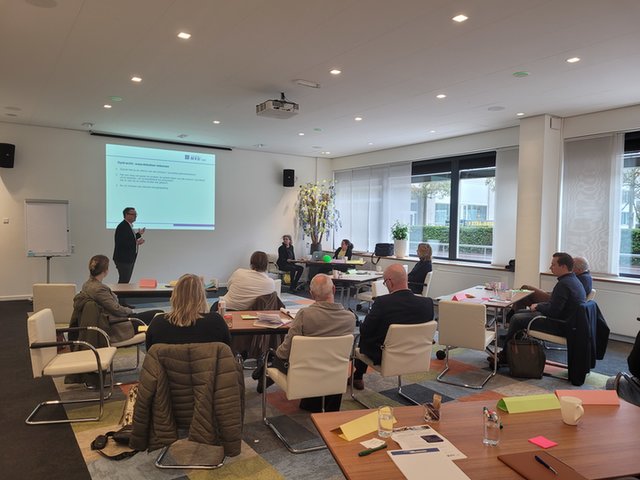
November 2023
Annual Progress Report 2022-2023
Outreach
The working group for Collective Actions and Upscaling is responsible for taking action to increase the collective leverage of the group as well as initiating, implementing and supporting collective action, for example, by setting up joint projects and research.
Due Diligence Roadshow
Significant progress in promoting IRBC within the metals sector was achieved by the Metals Agreement in the past year. A highlight of year 4 was the Due Diligence Roadshow. This initiative aims to raise awareness of IRBC within the metals sector and the Metals Agreement. It also enables companies to conduct due diligence on salient risks in their value chains. Several two-day training sessions were organised with the participation of 20 diverse companies. The Roadshow proved to be a tool in fostering engagement and in year 5 this endeavour will be continued in collaboration with the Renewable Energy Agreement and the TruStone Initiative.

OECD Forum Partner Session
Additionally, knowledge exchange took place during the partner session at the international OECD Forum on Minerals 2023, titled "Guaranteeing a Just Transition Towards Renewable Energy for All Parties”, in which collaborative opportunities to improve working conditions in metals mines were discussed. This was a collaboration between CNV Internationaal, the Metals Agreement and the Renewable Energy Agreement, where the significance of the Agreement approach was emphasized, company experiences were shared and further participation was requested. The panel consisted of Tata Steel, CNV Internationaal, Vattenfall, the Ministry of Foreign Affairs and the Social and Economic Council. The forum attracted a substantial number of stakeholders, solidifying the position of the Agreement in global efforts towards responsible mineral and metals value chains.

Environmental Responsibility in Global Mineral Supply Chains
The Chairperson of the Agreement, Tineke Lambooy, participated in a panel discussion on "Environmental Responsibility in Global Mineral Supply Chains" organised as part of the international conference, the European Resources Forum 2022, by the German Environment Agency. The goal was to show how human rights and environmental due diligence are implemented by companies and how this can help to make impact on the ground. The Chairperson presented how the multi-stakeholder collaboration in the Metals Agreement operates in practice and how collective risks are identified and addressed by the Parties.
Strengthening Relationships with Industry Associations
To amplify the Agreement’s impact, initiated efforts were made to engage and inform members of prominent industry associations such as FME, Koninklijke Metaalunie and Federatie Metaalplaat. These associations have taken an interest in IRBC and are now exploring collaborations with the Agreement. This collaboration facilitates an exchange of insights and promotes responsible business practices.
Hello & Goodbye
With much enthusiasm, a new company, metals wholesaler MCB Nederland, was welcomed as a Party to the Agreement. Their commitment to responsible business conduct strengthens our collective impact, and we look forward to their active engagement.
Simultaneously, E-MAX, Van Peperzeel and Unicef communicated their intention to depart from the Metals Agreement. Their reasons vary, from organisational restructuring to aligning with other sustainability initiatives. Hence, the companies were not evaluated within the context of this report. While the parties will be missed, the importance of continually aligning the Metals Agreement with the evolving goals and priorities of its participants is acknowledged.
Maurice van Beers, strategic policy advisor CNV Internationaal
“As we need metals for our energy transition, the demand for metals will increase four to six times. That makes it all the more urgent to improve transparency in the mining supply chain. To uncover hidden risks in mining value chains, we need to identify labour rights violations. Participatory monitoring can help with this. Data collected with quantitative tools allows us to assess risks to upstream and downstream users in the metals value chain.”

Chantal Dekker & Marc Holleman, Tata Steel Responsible Sourcing team
“Improvement starts with engaging in conversations deeper in the supply chain. This provides more mutual insight and creates room for action.”

